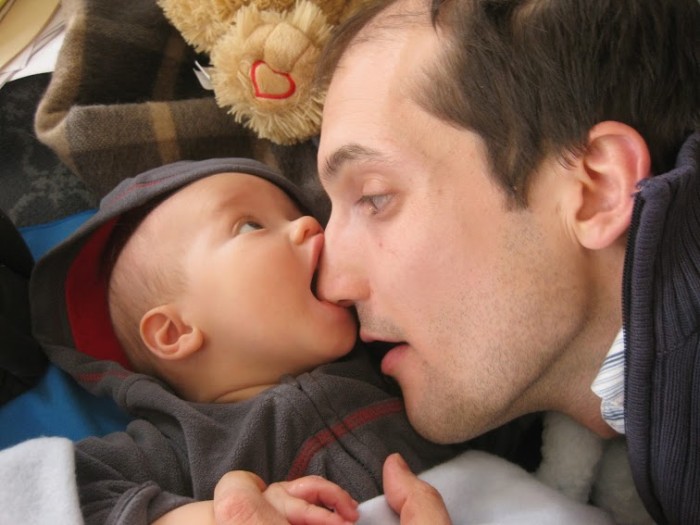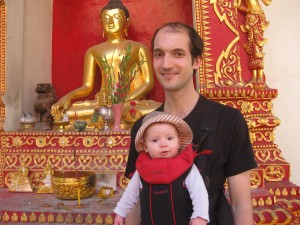
“The true value of a human being is determined primarily by the measure and the sense in which he has attained liberation from the self.”
~ Einstein
Most of the world’s religions have developed various methods of practice—meditation, prayer, yoga—to help us lessen the ego’s iron grip on our lives. Using different techniques, they point the way beyond falsely identifying with the little voice inside our heads that constantly shouts “me! me! me!” and allow us to step into a far vaster identity.
I’ve been at this game for some time now (though, of course, that’s misleading to say since disidentification with the “I” is the point of the “game”), and I’ve played it many different ways.
Sitting for long periods watching my breath.
Inhaling and exhaling at precisely defined intervals in a sort of controlled hyperventilation.
Encouraging my heart to gush out with praise for the love and grace of an enlightened being.
All of these methods have been successful in their own ways: they have each served as differently-angled mirrors for me to see my (non-ultimately existent) individual self.
But I have to say that becoming a parent has accelerated this process in a way that few other experiences or techniques have.
Because of the nature, frequency and urgency of the demands my infant son puts on me, being with him has forced me not just to theorize about the benefits of selfless living, but to concretely practice it every day.
When he cries in the middle of the night, or interrupts what I want to do, it’s difficult to prioritize my desires over his needs. Really, for any minimally caring parent, it’s not even a choice. And if there’s not really a question about whether to care for him, then perhaps the only thing I can choose is how to go about doing it.
This recognition of the primacy of perspective is an essential truth that all spiritual practices lead us to. We’ve been conditioned to think that outward circumstances are responsible for our well-being, when happiness actually depends more on our inward attitude toward the world than anything else. 
Depending on how I look at it, my son is either a burden or an opportunity. If I long to resurrect the ‘”old me” who started every morning with yoga, running or meditation, then I will only generate resentment and frustration. With a baby in hand, it’s simply not possible to return to the daily rhythm where I did whatever I felt like doing.
If I examine this situation closely (using the tools I learned through meditation), then I see that the “me” I miss is actually, like all past selves, irretrievably lost to the passage of time. The feeling that my son has taken something from me vanishes with the understanding that the greener grass I long for is an illusion.
So instead of looking at my son’s demands as an unfortunate but necessary sacrifice I must make, I’ve been trying to look at his cries and need for attention as an opportunity to apply the same virtues I seek to cultivate on the meditation cushion: patience, generosity and compassion.
In the few times where I’ve been able to successfully shift my perspective, I’ve seen what a difference it makes.
I try to apply the same capacity to witness my thoughts without becoming involved in them that I developed on the meditation cushion. If I can let go of the thought that “there’s something better I could be doing with my time,” I find myself calmer and more present with my son. Even if it’s 3 a.m. and his diaper needs changing, this technique helps me accept that I need to show up for what’s being asked of me in this moment.
Even if I can briefly touch this place of acceptance and understanding, the trouble is I quickly forget and must remember the Zen lesson over and over again: there is “no place else to go and nothing else to do.” For every instance where I can simply be present, there are countless others where I fail to detach myself from the constant clamoring in my head for things to be otherwise.
But that’s okay because I can also witness the voice that thinks that I should be making more progress in this regard, without getting caught up in all the doubt and inadequacy it evokes.
I try to listen to every voice in my head with the same presence, openness, innocence and curiosity I see in my son’s eyes. He reminds me of the importance of looking at life with beginner’s mind. If he can unselfconsciously look out at life without fixed opinions or attachment to the past, maybe I can too. 
Whenever I recognize self-centered thoughts arising, even if I’ve seen them a million times before, I try to investigate them with the same attentiveness and curiosity with which he looks at the stuffed clown he’s seen every day for the past month.
Well isn’t that fascinating? There’s that voice that always wants things to be different!
If this awareness arises, it prevents me from getting sucked into a storyline that only brings more discomfort and anxiety. I can poke and probe and look at this thought from different angles.
OK, so I wish I could go out and [fill in the blank] instead of walking the baby around the room for the thousandth time. But would I really be satisfied if things were different? Or would I just find something else to complain about?
If I can’t apply the presence that my son asks of me right now, what would be the point of doing anything else?
Awakening to this understanding can be a process that takes years on a meditation cushion. Or it can happen in a single moment with poop all over your hands in the middle of the night.
This is why it’s been so important for me not to see my son as an obstacle to spiritual practice.
True, the consistency and discipline I used to have in my daily meditation practice is gone. But in exchange, I’ve gained a (ridiculously cute) teacher who gives me all the structure and reminders I need. It doesn’t matter if I stake out formal practice periods in my day because he enables me to make every moment of life a spiritual practice.
And I feel that every day with this beautiful being opens my heart and allows me to love a little bit more—which you could say is the goal of all spiritual practice. Every day, he shifts my attention out of what I think about life into the direct, unfiltered experience of it. When I hold him in my arms, his poofy little cheeks awaken me to the poetry of every moment. All of this is done spontaneously, naturally, without effort.
There are no words to express how my heart is overwhelmed with love. Just looking at him is enough to melt away all the walls of sophistication and toughness that I’d put up around myself. Seeing his innocence reminds me of my own.
I’ve traveled the world, smoked fields of cannabis, passionately attended rock concerts for years and practiced a dozen different meditative techniques. And yet, this tiny 10 pound being has accelerated the transition from thinking to feeling in a way that none of these methods and experiences had been able to do.
I’m in the longest period of sustained joy I’ve ever felt in my life, and I owe it all to serving my toothless little Zen master. Far from being an obstacle to spiritual practice, he takes me deeper into what the spiritual life asks of me than I ever imagined.
Love elephant and want to go steady?
Sign up for our (curated) daily and weekly newsletters!
Assistant Editor: Kathryn R / Editor: Catherine Monkman
Photo: courtesy of the author


 Share on bsky
Share on bsky




Read 16 comments and reply